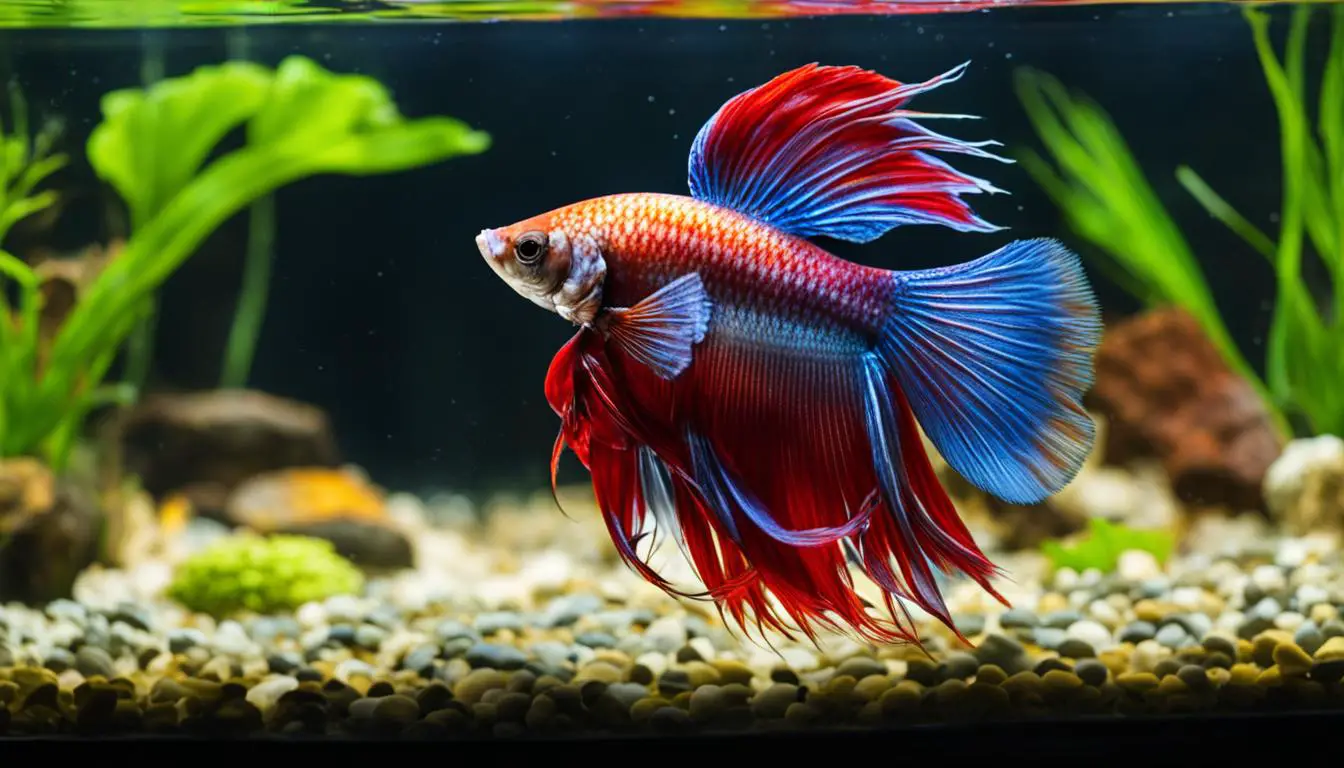Last Updated on 4 months by admin
If you’re a proud betta fish owner, you know how crucial it is to keep your little friend healthy and happy. Unfortunately, betta fish can fall prey to bloating, a condition that can have a severe impact on their health. Bloating can cause discomfort, inflammation, and even organ damage if left untreated. As a responsible pet owner, it’s your responsibility to ensure that your betta fish is free from this condition. In this article, we’ll provide you with the best steps to treat bloated betta fish and keep them healthy.
Key Takeaways
- Bloated betta fish can experience discomfort, inflammation, and organ damage if left untreated.
- As a responsible pet owner, it’s important to identify the causes and symptoms of bloating in your betta fish.
- Maintaining optimal water quality and feeding habits can significantly reduce the risk of bloating in betta fish.
- Implementing a consistent feeding schedule and introducing fiber-rich foods can help alleviate betta fish bloating.
- In severe cases, veterinary assistance may be necessary.
Understanding Betta Fish Bloating
Betta fish bloating is a common issue that can affect your aquatic buddy’s health. It occurs when there is an accumulation of gas in the digestive system, causing the fish’s abdomen to become swollen and distended. If left untreated, bloating can lead to constipation and, in severe cases, swim bladder disease.
Common symptoms of betta fish bloating include:
- Swollen and bulging belly
- Decreased appetite
- Lethargy and lack of energy
- Constipation and difficulty passing stool
Several factors can trigger betta fish bloating, including overfeeding, poor water quality, and improper diet. Understanding the causes and symptoms of bloating is crucial to identify the problem accurately and provide the best treatment.
Factors Contributing to Betta Fish Bloating
Betta fish bloating can be caused by a variety of factors:
| Causes | Symptoms |
|---|---|
| Overfeeding | Swollen belly, constipation, lethargy |
| Constipation | Swollen belly, difficulty passing stool, decreased appetite |
| Poor water quality | Swollen belly, stress, loss of appetite, lethargy |
| Improper diet | Swollen belly, constipation, lethargy, decreased appetite |
Reducing betta fish bloating involves identifying the cause and providing the appropriate treatment. In the following sections, we will explore effective methods to maintain your betta fish’s health and prevent bloating.
Assessing Water Quality
The quality of water in your betta fish tank is essential to maintain a healthy and happy aquatic environment. Poor water conditions can contribute to betta fish bloating and other health issues. Keep a check on the following water parameters to reduce bloating in betta fish and provide optimal water quality:
- pH Levels: Maintaining a neutral pH level between 6.8-7.4 is crucial for the health of your betta fish.
- Ammonia Levels: Ensure that ammonia levels remain below 0.25 ppm by regularly cleaning the tank and replacing the water.
- Nitrate and Nitrite Levels: Aim to keep nitrate and nitrite levels below 20 ppm.
- Water Hardness: Betta fish prefer soft water with a range of 5-15 dGH.
Testing the water regularly is recommended to identify any changes in water parameters and take action accordingly. Use a reliable water testing kit and make necessary adjustments to maintain ideal water conditions in your betta fish tank.
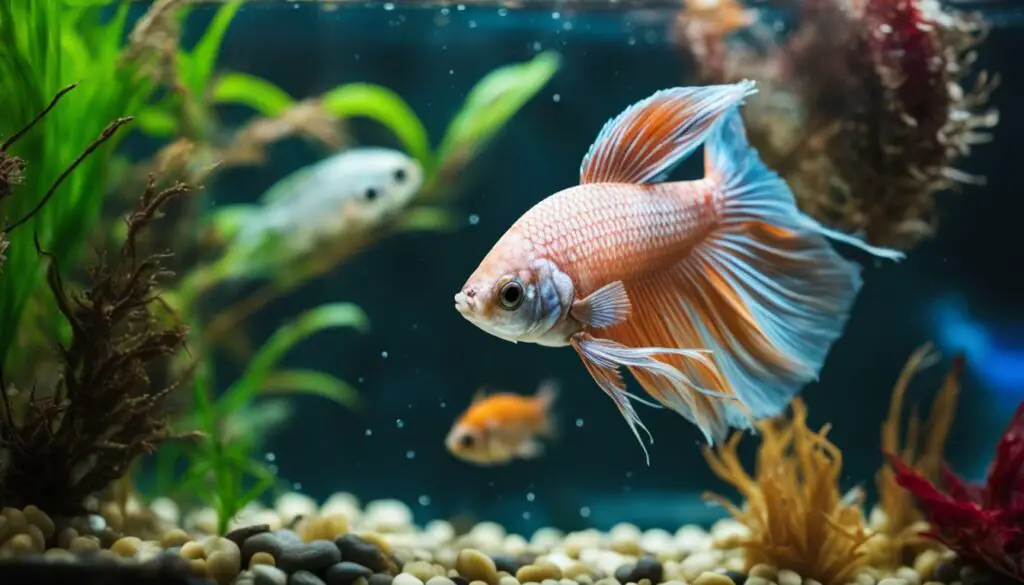
Adjusting Feeding Habits
Betta fish bloating can be a result of improper feeding habits, such as overfeeding or feeding the wrong type of food. Here are some tips to help reduce bloating in your betta fish:
Proper Feeding Amounts
When feeding your betta fish, it’s crucial to provide the right amount of food. Overfeeding can lead to digestive issues and bloating. A good rule of thumb is to feed your fish no more than what they can consume within two minutes.
The Right Type of Food
The right type of food is vital to maintaining a healthy diet for your betta fish. Avoid feeding them too much dry food, as it can be difficult for them to digest and lead to bloating. A well-balanced diet should include a mix of dry and live or frozen foods such as brine shrimp, daphnia, or bloodworms.
Portion Control
Portion control is key to maintaining a healthy diet for your betta fish. Feed them small portions several times a day instead of one large meal. This approach can help prevent overeating and bloating.
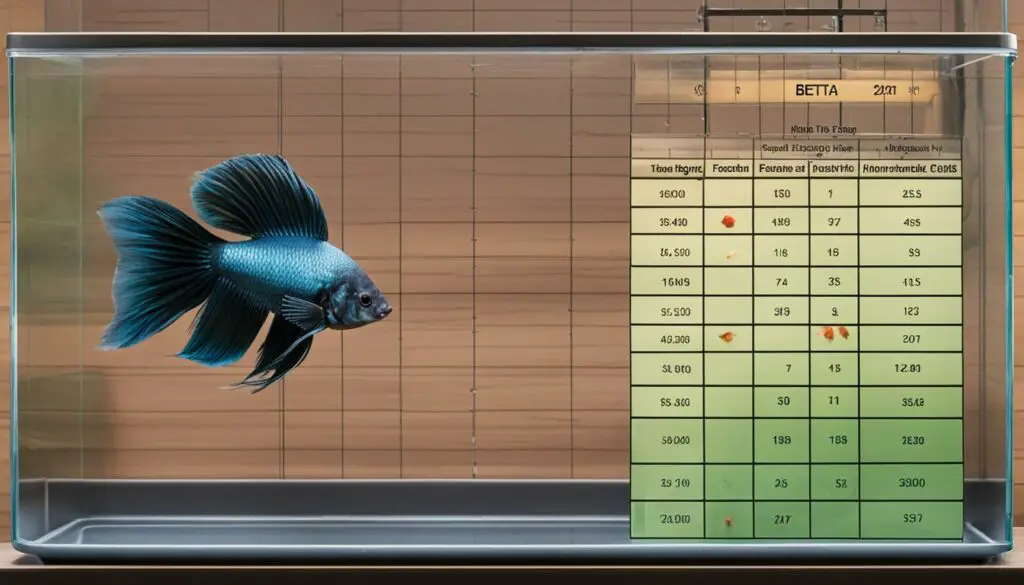
Pro Tip: Avoid feeding your betta fish any human food. It can be harmful to their health, leading to digestive issues and bloating.
By adjusting your feeding habits, you can help reduce the risk of bloating in your betta fish. Be sure to implement these changes gradually to avoid any stress or shock to your fish. A well-fed and healthy betta fish will be a joy to have in your aquarium.
Implementing a Consistent Feeding Schedule
Establishing a regular feeding schedule is essential to maintain healthy digestion in betta fish. It’s crucial to ensure that your fish receives the right amount of food at the correct time to reduce the risk of bloating.
Overfeeding is a common cause of bloating in betta fish. It’s recommended to feed your fish small, frequent meals instead of big portions once or twice a day. This helps to prevent overeating and maintains a healthy digestion process.
It’s also crucial to avoid giving your betta fish food that is too high in protein or fat, which can lead to bloating. Instead, opt for high-quality fish flakes or pellets that are specifically designed for betta fish and have a balanced nutritional profile.
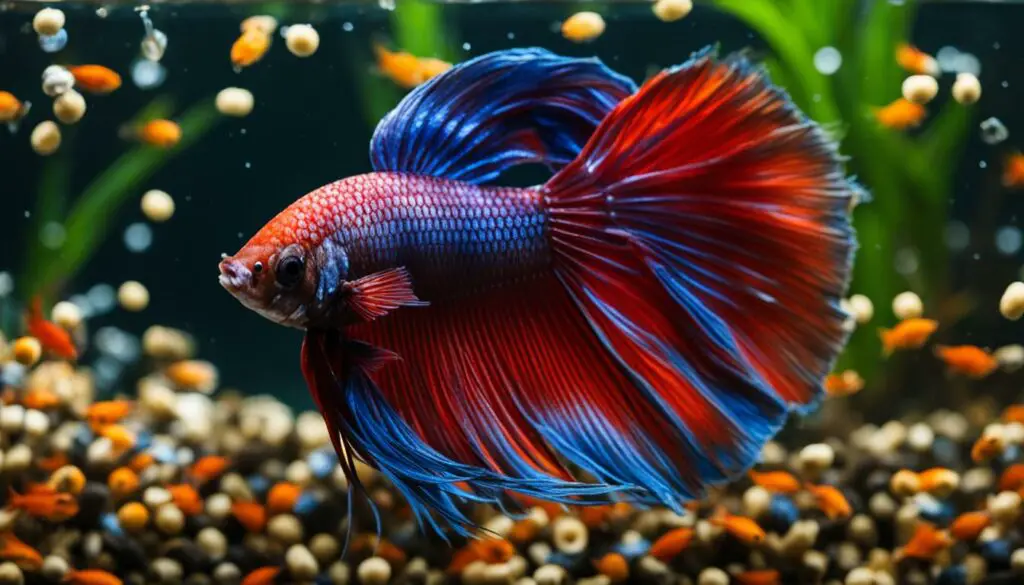
Avoid feeding your betta fish live or frozen foods, as they can be hard to digest and lead to constipation, which can ultimately cause bloating. If you’re considering supplementing your fish’s diet with treats, make sure they’re low in fat and protein and only give them occasionally.
By implementing a consistent feeding schedule and providing your fish with high-quality food, you can help prevent bloating and keep your betta fish healthy and happy.
Introducing Fiber-Rich Foods
When it comes to treating a bloated betta fish, adding fiber-rich foods to your fish’s diet can help alleviate bloating. Fiber helps regulate digestion and keeps the bowel movements regular, reducing the risk of constipation and bloating.
The best sources of fiber for betta fish include vegetables such as peas, cucumbers, and carrots. You can also add some fruits, including papaya and oranges, to provide your fish with additional vitamins and minerals.
| Fiber-Rich Foods for Betta Fish | Benefits |
|---|---|
| Peas | Rich in fiber and vitamins, peas aid digestion and prevent constipation. |
| Cucumbers | Low in calories, cucumbers are a great source of hydration and provide betta fish with fiber and essential minerals. |
| Carrots | High in vitamins and fiber, carrots improve digestion and support a healthy immune system. |
| Papaya | Papaya contains enzymes that aid digestion and prevent bloating in betta fish. |
It’s important to note that betta fish are carnivorous, and feeding them a diet primarily consisting of vegetables can cause nutritional deficiencies. Therefore, you should only add fiber-rich foods as supplements to their regular diet.
Introducing fiber-rich foods to your betta fish’s diet is a great bloated betta fish remedy. However, if your fish is experiencing severe bloating, it’s best to consider other treatment options or seek veterinary assistance.

Addressing Constipation Issues
If your betta fish is experiencing bloating, constipation may be the culprit. Constipation occurs when your fish is not able to digest food properly and excrete waste. It can lead to blockages in your fish’s digestive tract and cause bloating.
To effectively address constipation issues, try the following remedies:
- Fast your betta fish: This involves withholding food for a period of 24-48 hours to allow the digestive tract to clear out.
- Feed your betta fish with a boiled pea: This can be a good source of fiber to assist in digestion. Remove the outer skin and mash the pea for your fish to eat.
- Use Epsom salt: This can help your fish to pass stool and relieve constipation. Dissolve a small amount of Epsom salt in clean water, add your fish and monitor it carefully. Ensure to follow the recommended dosage and consult with a professional if you are unsure.
- Change the diet: Consider switching to a high-fiber diet to prevent constipation, always adjusting the new meal gradually over several days to let your fish adapt to the new diet.
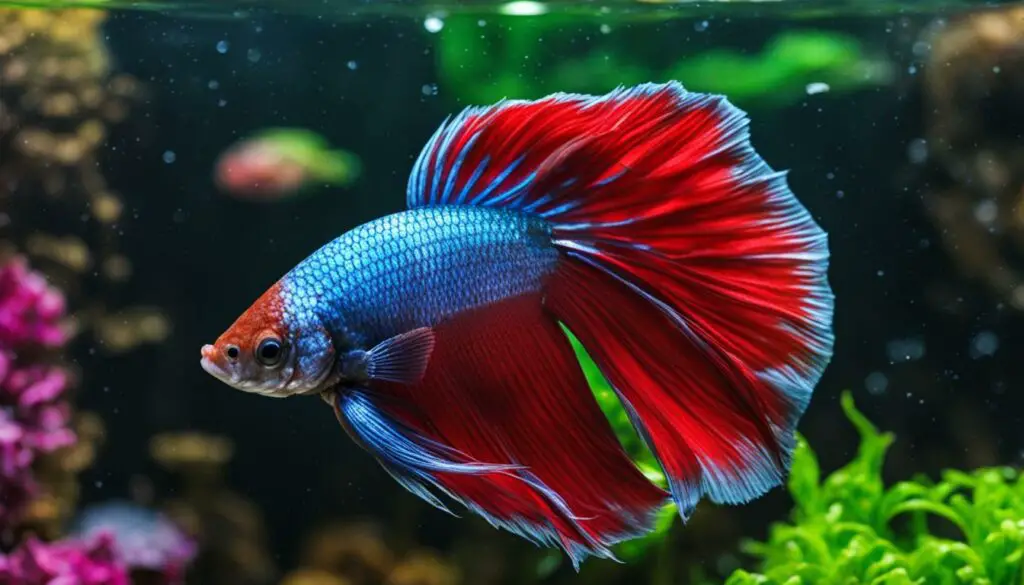
Did you know? Using a high-fiber diet with less protein can help your betta fish to digest food more efficiently and reduce the likelihood of constipation and bloating.
Seeking Veterinary Assistance
If the bloating in your betta fish persists despite your best efforts, it may be time to seek professional help. A veterinarian experienced in aquatic animal care can diagnose the underlying cause of the bloating and provide an appropriate treatment plan.
It’s essential to observe your betta fish’s behavior and note any other symptoms such as lethargy, loss of appetite, or discoloration of fins or body. These could be signs of a more severe underlying illness that needs urgent attention.
When you consult the veterinarian, provide them with your observation and the steps you’ve taken to alleviate the bloating. This information can help the veterinarian in their diagnosis and treatment plan.

Depending on the severity of the condition, the veterinarian may prescribe medication or recommend a specific diet to improve the fish’s health. Follow their instructions carefully, and return for follow-up appointments to ensure the treatment plan is working effectively.
While seeking veterinary assistance is a crucial step in treating bloated betta fish, it’s equally important to take proactive measures to prevent the issue from reoccurring in the future. Maintain a clean and healthy tank environment, monitor feeding habits, and observe your betta fish’s behavior closely for any signs of stress or illness.
Conclusion
By following the simple steps outlined in this guide, you can effectively treat your bloated betta fish and ensure its good health. Remember to assess the water quality regularly and adjust feeding habits to prevent bloating.
Establishing a consistent feeding schedule and incorporating fiber-rich foods can aid in digestion, reducing the risk of bloating. If your betta fish is experiencing constipation, identify the symptoms and take immediate steps to relieve the issue.
In severe cases of betta fish bloating, seek veterinary assistance to ensure your fish receives the necessary treatment promptly.
With these tips, you can relieve bloating in your betta fish and maintain a happy and thriving aquatic companion. Trust us, your betta fish will thank you for it!
FAQ
What causes bloating in betta fish?
Bloating in betta fish can be caused by various factors such as overfeeding, constipation, poor water quality, or an underlying health issue.
How can I identify if my betta fish is bloated?
Look for signs such as a swollen or distended belly, loss of appetite, lethargy, or difficulty swimming. If you notice these symptoms, your betta fish may be bloated.
How do I maintain optimal water conditions for my betta fish?
Regularly test the water parameters such as pH, ammonia, and nitrite levels. Keep the tank clean by performing partial water changes and ensure proper filtration.
What should I feed my betta fish to prevent bloating?
Offer a varied diet consisting of high-quality betta pellets, small portions of freeze-dried or frozen foods, and occasional treats like bloodworms or brine shrimp.
How often should I feed my betta fish?
Feed your betta fish 1-2 times a day, with small portions that can be consumed within a few minutes. Avoid overfeeding as it can lead to bloating.
Are there any specific fiber-rich foods that can help with bloating?
Yes, certain vegetables like peas or dandelion leaves can be beneficial for betta fish digestion. Offer these foods sparingly as an occasional supplement to their regular diet.
How can I relieve constipation in my betta fish?
You can try feeding them a small piece of peeled and boiled pea, or using specialized fish laxatives available at pet stores. It’s important to monitor their condition and consult a veterinarian if necessary.
When should I seek veterinary assistance for my bloated betta fish?
If your betta fish’s condition does not improve with proper care and treatment, or if you notice any other concerning symptoms, it’s advisable to consult a veterinarian to ensure a proper diagnosis and appropriate treatment.

